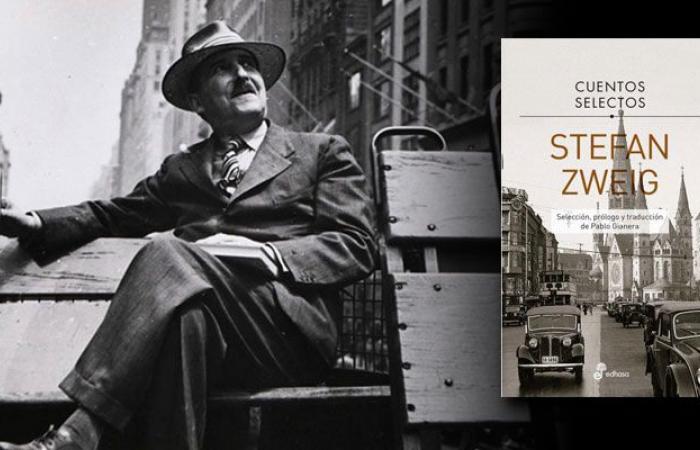These “Selected Stories” by Stefan Zweig, which Edhasa has just published, give us an opportunity to approach an author who was widely read and recognized at the time, and then fell into oblivion. The causes of this? They may be the translations (which have not been updated) of his work, with outdated and unattractive language, or perhaps the vast but uneven production of biographies, memoirs, short stories and novels.
Despite his great fame, Zweig had to be exiled from his country given his status as a Jew and pacifist. They were times of Nazism. Zweig lived in Great Britain, the United States and finally Brazil. Place where, in 1942, he took his own life with his wife, since he foresaw the destruction of Europe and a triumph of Nazism.
“A little summer novel” is the first piece of this selection. At first it is an apparently insubstantial narrative, full of nostalgia about the universe of the Habsburgs: baronesses, nobles and eccentrics of indeterminate nationality. Then the true narrator of the story enters the scene, a gentleman of Estonian origin, of distinguished appearance and English appearance. With some vagueness at the beginning, he recounts the manipulation of a young teenager in that same resort through some cleverly written anonymous letters.
The man convinces her that she is the recipient of the love of a young Italian boatman at the station. Too shy to speak to the boatman, the girl pines for her imaginary admirer and is devastated when she is forced to leave before responding. Thus, suddenly, this seemingly frivolous “summer novel” is, in reality, terribly cruel; The man’s erotic fixation on that teenager being the most worrying element of all.
Then follows one of Zweig’s classics, “Mendel the Bibliophile.” A fan of books, he lives by and for them, totally abstracted from reality. That’s why, in the middle of the First War, he is accused of being a spy and he has no idea what they are talking to him about. There is a situation that is reminiscent of Kafka’s “The Trial”, only in Zweig’s fiction the readers understand perfectly what is happening and only the protagonist ignores it. Mendel ends up devastated by his time in prison, and is never the same again. When we finish reading “Mendel the bibliophile” we are left with the expressed idea that whoever writes books does so with the aim of overcoming death and not being forgotten.
“An Episode on Lake Geneva” recounts the rescue, in 1918, of a Russian floating in the water, who turns out to be a deserter to the Great War. He was sent to the front without understanding the true reasons for exposing his life, and when he is wounded and hospitalized, he takes the opportunity to escape. After days of wandering, he swims across Lake Geneva and can only make himself understood to express his obsession: returning to his home in Siberia. The story is resolved after political realities and bureaucracy come into play, precipitating the outcome.
“The invisible collection. An Episode of German Inflation” is, perhaps, the most notable story in the book. As its title announces, the story takes place in the 1920s, after the Great War and with Germany mired in the disastrous consequences of the Treaty of Versailles: misery, strong inflation, few beneficiaries and many oppressed. In this context, the story is told of an art collector who lost his sight and lives with his family. He believes he still possesses the collection that he was able to put together during his years of success, without suspecting that, due to hunger and misery, his family was gradually selling his most outstanding works.
He lives in physical and spiritual blindness, deceived by necessity, and in the midst of an illusion.
The last story is another classic by Stefan Zweig: “Chess Novel”. This story has two peculiarities: it is the last thing that Zweig wrote before committing suicide (he committed suicide in February 1942, and this story was published in December of the same year), and it is the only fiction where he makes a direct allusion to Nazism, naming Hitler. and the Gestapo.
During a long boat trip from Europe to Buenos Aires, where the world chess champion is traveling, amateur games are organized where he is challenged. He wins easily every time, until Dr. B., a silent passenger, scores a draw. The champion, surprised and upset, asks for revenge. On the eve of that game, Dr. B. says that he never played chess, but that he knows games by heart since he studied them from a manual during a prolonged confinement with total isolation by the Gestapo. In fact, Dr. B. is on that ship escaping from the Nazis. What is striking about the story is that the world champion, Mirko Czentovič, was also an amateur chess player, who, without any culture or education, just by observing how others played, developed an inexplicable facility to defeat anyone who opposed him.
A story where intuition, necessity and loneliness play a predominant role.
“Selected Stories”, by Stefan Zweig, is another gateway to a work that in recent years has had a well-deserved revaluation. A work that in a different context than then, but not so different, seems to warn us from the past about the dangers of war and fanaticism.






